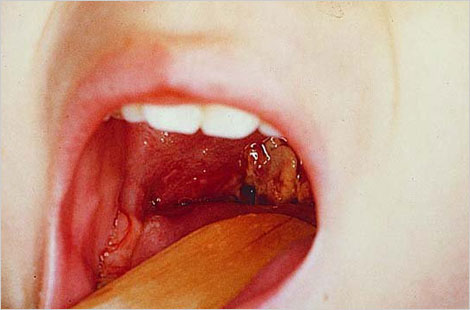The current diphtheria outbreak in Nigeria which began in May 2022 has continued to claim lives and spread to more states. The federal and state governments say they have put in place several measures to reduce the spread of the disease.
Diphtheria is a highly contagious vaccine-preventable disease caused by Corynebacterium diphtheria, mainly spread through direct contact with an infected person or exposure to airborne droplets.
Data from the Nigeria Centre for Disease Control and Prevention (NCDC) showed that a total of 2,455 suspected cases were reported from 24 states between May 2022 and June this year.
The latest situation report from the organisation revealed that 137 deaths and 1534 confirmed cases have also been recorded across eleven states and 33 local government areas.
Diphtheria kills 137, infects 1,534 persons across 11 states-NCDC
ECOWAS slams fresh sanctions on Niger as junta rejects diplomatic overtures
The states are Cross River, Kano, Katsina, Kaduna, Lagos, Osun, Yobe, and Federal Capital Territory (FCT).
The NCDC said Kano (2,171), Yobe (95), Katsina (61), Lagos (29), FCT (22), Sokoto (14) and Zamfara(13) accounted for 98.0% of suspected cases.
It said the majority (589 representing 71.5%) of the confirmed cases occurred among children aged 2–14 years.
“Only 181(21.7%) out of 836 confirmed cases were fully vaccinated with a diphtheria toxin-containing vaccine, “the report said.
States, FG responses
The Yobe State government has treated and discharged 289 diphtheria cases in seven local government areas of the state.
These are Nguru, Gulani, Bursari, Potiskum, Tarmuwa, Damaturu and Nangere.
Daily Trust learnt that over 30 persons including children were killed in the state, especially in Potiskum and Nguru LGAs.
The Senior Special Assistant to the Governor on Health Matters, Dr Muhammad Lawan Gana, said the active cases are currently in the isolation centres of specialist hospitals, Potiskum and Damaturu, adding that 289 cases have been treated and discharged.
Dr Gana said the state government and partners have been making various interventions in fighting the outbreak while strategising a more coordinated result-oriented means of preventing, managing, and ending the cases in the state.
He said, ‘‘There is also the provision of necessary drugs and DAT for use in the state. Government is intensifying training of clinical staff to effectively manage cases.’’
The Kano State Commissioner of Health, Dr Abubakar Labaran Yusuf, in his update on diphtheria, said the state recorded 130 cases in the past weeks, and that three treatment centres have been established in the state.
“Governor Abba Yusuf has since directed the ministry to swing into action to curtail the spread of the deadly disease. Three designated centres have been provided for treatment and admission.
“The general public should not hesitate to seek medical assistance whenever they experience any of the symptoms listed by the Nigeria Centre for Disease and Control.”
The most affected local government areas of the state are Ungogo, where the index case started, Dala and Fagge.
In Nasarawa State, the government said it is collaborating with the World Health Organisation (WHO) to fight any outbreak of diphtheria disease across 13 local government areas of the state.
Dr Liman Muhammed, the state epidemiologist and the deputy director of Public Health, the State Ministry of Health, said there was no confirmed case of the disease in the state. He, however, said drastic measures have already been put in place to avert any possible outbreak.
“We have ordered all our DSNOs across the 13 local government areas to look for cases of mild fever, sore throats, and difficulty in breathing in children and to report to the ministry for proper action.
“I received a call from Keffi LGA of a physician who has allegedly seen cases of sore throats and mild fever, but we have not confirmed yet and an investigation is going on,” Dr Muhammed said.
He called on people, particularly pregnant women, to always bring their children for routine immunisation.
The Executive Director of the National Primary Health Care Development Agency (NPHCDA), Dr Faisal Shuaib, said diphtheria is totally preventable through vaccination, adding that however, despite the efforts of the federal government to provide safe and cost-effective vaccines, a significant number of children remain unvaccinated or partially vaccinated, thereby compromising the country’s goal of achieving population immunity.
Speaking during a news briefing on the diphtheria outbreak response, he said, “Suboptimal vaccination coverage has been the main factor contributing to these outbreaks, with the most affected age group being those between 2 and 14 years.”
He said the NPHCDA, in collaboration with the Federal Ministry of Health and NCDC, the states and other partners, is mobilising all necessary resources to respond effectively to this outbreak.
He said the response to the ongoing diphtheria outbreak will be carried out in two phases. The first phase and immediate response will encompass 25 local government areas (LGAs) across Bauchi, Katsina, Yobe, and Kaduna states, which will begin on August 7 and end on August 11.
He said the second phase will cover outbreak response in 171 local government areas.
“This phase is planned to be conducted in three rounds. The first round will commence on August 21, followed by the second (2nd) and third (3rd) rounds tentatively set for September 18 and October 16, respectively. Each of these three rounds will span five days,” he said.
WHO Nigeria Country Representative, Dr Walter Kazadi Mulombo, said 1800 vials of Diphtheria Antitoxin (DAT) and erythromycin IV for the case management of diphtheria cases have been acquired while erythromycin is expected in one to two weeks.
“These health commodities are essential for saving lives and reducing the sequelae in the affected patients, thus need to be prepositioned in the country and ready to be deployed to the states in need,” he said.
He said the WHO is working with NPHCDA to organise the 1st phase of the vaccination campaign targeting children from zero to 14 years old in four states and that the WHO will support it with N92 million.
UNICEF Nigeria Chief of Health, Eduardo Celades, called on government and other stakeholders to ensure ‘a big catch-up’ by ensuring that children who missed vaccination during COVID-19 are vaccinated.
He said 80 per cent of children affected by diphtheria in the country are either not vaccinated or have not completed vaccination.
The NCDC in a diphtheria advisory signed by its director general, Dr Ifedayo Adetifa, said it has activated a multi-sectoral national Diphtheria Technical Working Group as a mechanism for coordinating surveillance and response activities across the country.
He said the response activities include coordination, surveillance, laboratory investigation, risk communication, case management and immunisation activities.
Experts give reasons for spread and way out
A medical consultant and environmentalist at Specialist Hospital, Yobe, Dr Babangida Usman, said diphtheria is affecting majorly zero-dose vaccination households, especially children under two years.
He added that as the rainy season sets in, cases of malaria are also feared to complicate the diphtheria outbreak, hence the need for massive sensitisation of the communities on the outbreak, especially on how to prevent them. Adequate mobilisation for the acceptance of immunisation among the people is also needed, he added.
In Kano, a medical doctor and an epidemiologist, Dr Shuaibu Sani Shuaibu, said the failure of parents to get their children vaccinated at the age of two is one of the reasons for the outbreak and spread of the disease in Kano, adding that the delay in infected patients to respond to treatment also caused its spread.
“The incubation period for the diphtheria is two to five days, after which it will escalate. But people have not been identified to have the disease and they move among people. Their contact with people will also increase the numbers,” Dr Shuaibu said.
He said the high population of Kano State and the fact that it is a commercial city that attracts people every day is one of the reasons for the spread of the disease.
He said Kano has had 70 per cent of the cases of the disease, which made it declared an epidemic in the state.
“Since last year when the disease started, only 40 per cent of the victims were vaccinated; the remaining 60 per cent did not take vaccines at their early ages which is one of the major reasons,” he said.
Dr Shuaibu said the way out is to get children vaccinated. “Three dosages are admitted on children at their early two months. Children are the most dangerous, followed by the elderly and vulnerable people.
“Environmental sanitation is also very key. People should always keep their environment clean and tidy. There should also be a mass screening for detection of the infected people so that they will be treated promptly. If you don’t detect and treat them, they will spread the disease across,” he said.
He urged women across the state to always bring children for vaccination against diphtheria disease, saying that last Friday at about 10: pm, he was alerted about suspected cases of diphtheria by a doctor in Keffi LGA, but an investigation is still ongoing to ascertain whether it was true.
By Ojoma Akor (Abuja) Zahraddeen Yakubu Shuaibu (Kano) Habibu Idris Gimba (Damaturu) Umar Muhammed (Lafia)

 Join Daily Trust WhatsApp Community For Quick Access To News and Happenings Around You.
Join Daily Trust WhatsApp Community For Quick Access To News and Happenings Around You.


